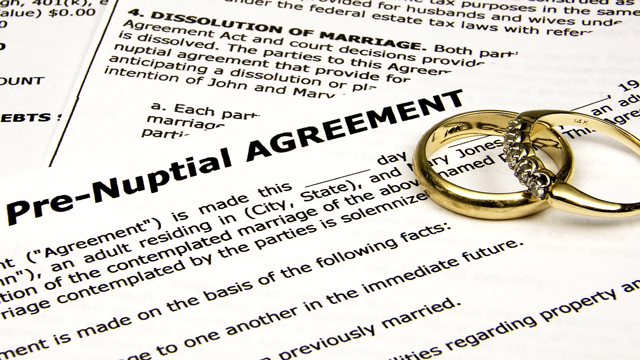Erica was taken by surprise when her fiancé suggested a prenuptial agreement. She had been so focused on planning the wedding itself – the venue,
the reception, the dress, the wedding party – that the thought of a premarital agreement had not entered her mind. She realized that her fiancé was a little bit older, and he already had an interest in the business his father had started, but he and Erica had never engaged in a serious discussion about finances. She wondered if it meant he wasn’t really committed to their marriage. Did he not love her or trust her as much as he said he did? Was he too selfish to make a marriage work? At least he didn’t wait until after the invitations had gone out to tell her about it. She knew there was time for her to sort out whether she wanted to enter into a marriage with a prenuptial agreement, or to work out with her fiancé what the terms of such an agreement would be.
Certainly, it is important to consider the motivation when a prenuptial agreement is suggested, but realize prenuptial agreements no longer are just for the rich and famous. Many people – even of moderate means – are entering into prenuptial agreements and for good reasons. A prenuptial agreement (often referred to as a prenup) is a contract made between two people before they marry with the intent that it takes effect after the marriage. It spells out the legal rights and responsibilities that will apply in the event of death or divorce. This lets the couple decide what they wish to have happen, instead of it being decided based on state laws designed for the general public.
It is never easy – but always important – to talk about money before getting married. Here are situations in which anyone contemplating marriage should consider a prenuptial agreement:
• One or both of you has a child or children from a prior marriage
• One of you is wealthier or more financially responsible than the other
• One or both of you owns stocks and bonds, certificates of deposit, brokerage accounts, retirement accounts, or other significant assets, or are expecting an inheritance
• You’re entering into a same-sex marriage
• One or both of you owns an interest or a partial interest in a business
• One or both of you has significant debts or obligations
• You have elderly parents or a child with special needs who will need financial help
• You have a significant health concern
Prenuptial agreements can be helpful to make sure both parties have the same ideas about how the marriage will work financially, clarify each person’s rights and responsibilities during marriage and after, spell out protections for any children of prior marriages in a blended family situation, and avoid arguments in case of divorce or death. Of course, having an agreement does not stop a person from being more generous to the other person than the agreement requires, but it sets out minimum requirements.
Agreements made long before the wedding date are more likely to be considered fair, even if the parties have unbalanced financial circumstances. To be enforceable, premarital agreements must be deemed fair and reasonable. Each person needs adequate time to think about the idea of a prenup and the terms for the agreement. Not only is a prenup discussed well in advance of the wedding date more likely to be enforced, it also goes a long way toward getting interested parties talking about money – an issue that will affect their relationship for the rest of their lives.
Prenuptial agreements should be in writing and signed by both parties with a full disclosure of all assets, liabilities, and income from each of you attached as part of the document. Each person should have a signed original, and you should be sure you have placed yours in a location where it always will be accessible to you in case you need it any time in the future.





